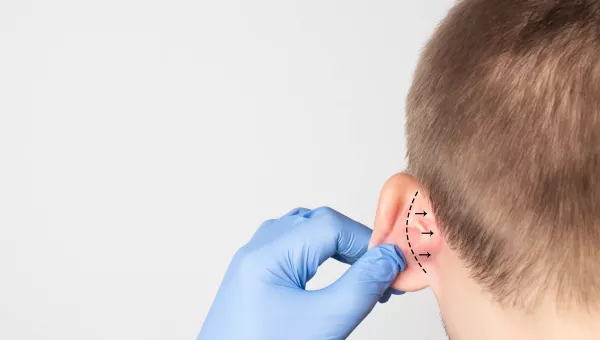What Is Ear Reconstruction?
We see patients (from children to adults) who are unhappy with the size, shape or appearance of their ears. They might say their ears are too big, protrude outward more than they should or don’t match each other.
Instead of feeling self-conscious, ear reconstruction can help. This type of surgery reshapes and refines the appearance of the ears. It also addresses conditions, like “cauliflower ear” and overly large or stretched earlobes.
Refine the appearance of your ears
Ear reconstruction can restore your self-confidence. You can trust that Cape Fear Valley Health plastic surgeons will listen to your concerns and answer your questions. We’ll evaluate your health needs, cosmetic goals, and skin to determine if ear reconstruction is right for you.
Our Approach to Ear Reconstruction
At Cape Fear Valley Health, our plastic surgeons stay up-to-date on the latest medical advances and innovations. Enjoy first-class care in the comfort of your hometown.
Understanding Your Goals
Our compassionate, warm, and friendly staff will treat you like a friend, not a number. Your Cape Fear Valley Health plastic surgeon will discuss your treatment goals and carefully evaluate your specific areas of concern. Answering your questions and helping you feel informed is what we’re here for.
We Stay Connected
After your ear reconstruction, we’ll make sure you understand how to take care of yourself. Recovering from surgery takes time, but we’ll be checking in with you to make sure you’re healing properly.
Your Ear Reconstruction Team
You’ll have a team of experts alongside you from the moment you call our office. They include:
- Plastic surgeons
- Licensed Practical Nurses
- Medical staff
What to Expect With Ear Reconstruction
Ear reconstruction takes between one and two hours. You won’t feel any pain because you’ll be under general anesthesia. You’ll be able to go home after the procedure is over.
Your plastic surgeon will make an incision behind the ears. Then, your plastic surgeon will reshape the cartilage to create an aesthetically pleasing appearance and remove any excess skin. Once the adjustments are complete, your plastic surgeon will close the incision with sutures (small surgical stitches).
You’ll have three types of ear reconstruction surgery options:
- Ear pinning: If you’re happy with size and shape of your ears, but are concerned with how far they stick out, your plastic surgeon might recommend ear pinning. This type of surgery allows your doctor to reposition each ear so that it lies closer to your head.
- Reconstructive ear surgery: For patients with deformities or injuries to their ears, this type of surgery combines multiple techniques to recreate the appearance of a natural ear. If there is not enough natural tissue in place, your plastic surgeon can use skin grafts to complete the surgery.
- Ear reduction surgery: This surgery is geared for people whose ears are too large, asymmetrical or whose earlobes dangle too low. Your plastic surgeon will remove excess skin and reshape the cartilage to provide a balanced look between both ears.
Ear Reconstruction Consultation
Your Cape Fear Valley Health plastic surgeon will discuss your treatment goals and carefully evaluate your ears. Next, they’ll make a recommendation based on your desired results and develop your personalized treatment plan.
Are You a Candidate for Ear Reconstruction?
Ear reconstruction surgery is helpful for people who feel self-conscious about the size or shape of their ears.
Procedures work best on patients who:
- Are in good overall health.
- Don’t drink alcohol for two weeks before surgery. (Alcohol acts as a blood thinner, which increases the risk of excess bleeding during surgery.)
- Quit using nicotine products three to six weeks before surgery and three to six weeks after. (Nicotine increases your risk of surgical complications, like blood clots.)
Ear Reconstruction Recovery and Results
After ear reconstruction, you will need to take one to two weeks off work. During this time, you should:
- Get plenty of rest.
- Wear post-operative bandages for several days. When you come back for your first check-up, we will give you a headband to wear to protect your ears.
- Avoid strenuous activities for about two to four weeks.
- Sleep with your head on the back of a pillow for two weeks.
Discomfort, mild bruising, and swelling may last between one and two weeks. You’ll be able to see results from your ear reconstruction within three months.
Ear Reconstruction Risks
Like all surgeries, ear reconstruction involves a certain degree of risk. However, when it’s performed by a qualified and experienced plastic surgeon, serious complications are rare. Minimize other complications by following the instructions and advice of your plastic surgeon.
Some risks and complications could include:
- Asymmetry
- Blood clots
- Infection
- Persistent pain
- Poor wound healing or changes in skin sensation
- Skin discoloration or swelling
- Scarring




